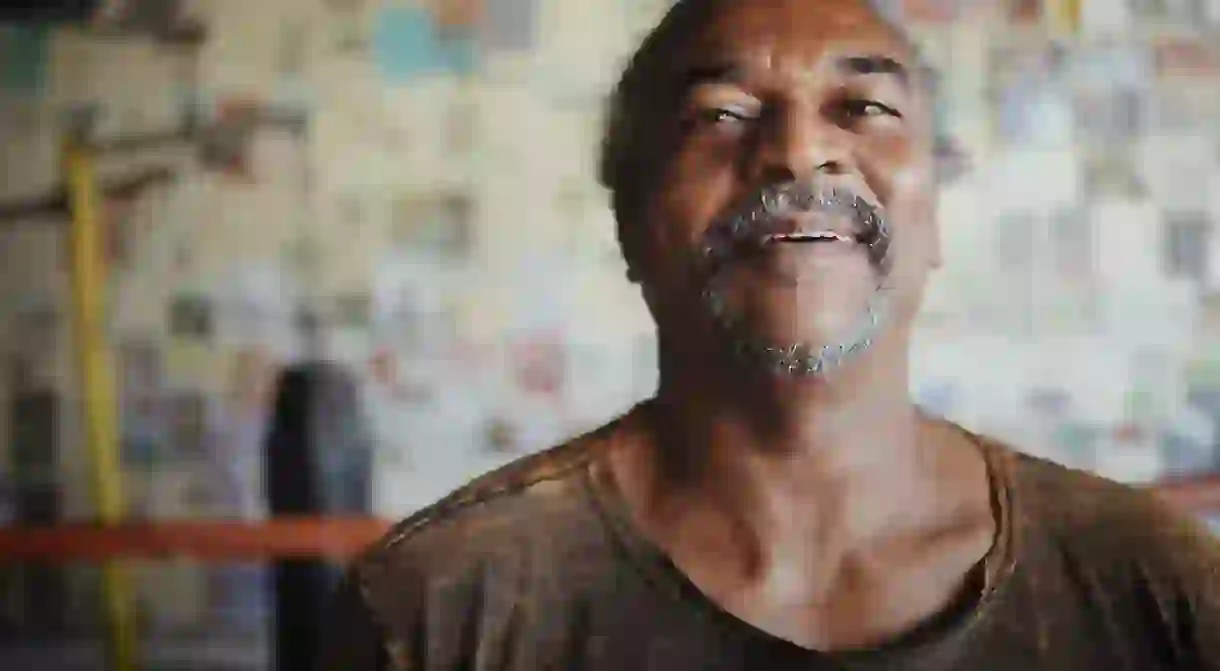Meet the Boxing Instructor Who Is Changing the Lives of São Paulo's Homeless People

One of the most persistent issues in São Paulo is the use of space, both public and private. Across Brazil as a whole, 6.2 million families are homeless, even though there are seven million properties lying empty and unused. In the country’s biggest city, this disparity is magnified, and São Paulo has a very visible housing problem. The precarious conditions on the streets often lead São Paulo’s homeless citizens to drug addiction or crime.
Over the years, the spaces underneath the city’s bridges and freeways have been used for shelter by homeless people, or in some cases, as drug dens. These spaces are left to decay, forgotten by the public authorities.
Under the Alcântara Machado bridge, however, things are a little different. As you approach the area, in the central region of Brás and on one of São Paulo’s most important roads linking the center to the mega-populous east, the bridge looks no different from any other in the city. The concrete is gradually decaying, there are piles of waste illegally dumped by passersby, and the nearby homes and businesses are covered in graffiti.
As you step down to ground level, things change. Behind a steel chain-link fence, people of all ages and walks of life – some in dirty, old clothes, others in expensive gym gear – are hitting punch bags, jumping rope, and lifting weights. Welcome to Garrido’s boxing gym, one of São Paulo’s most unique social projects.
Opened back in 1998 by former boxer Nilson Garrido, now 61, Garrido Boxe is a boxing gym that is open to the public, particularly the homeless and impoverished populations in the surrounding area of Brás. Since its inception, Garrido Boxe has been a place where all are welcome, offering underprivileged people a place to keep in shape and keeping potentially vulnerable individuals off the street.
At first, Garrido’s gym equipment was composed entirely of recycled and scrap materials, which are still there today. The project gradually became more and more famous. “At the time there was lots of attention from the press, talking about this ‘crazy man under the bridge’ who was doing something different,” Garrido recalls. “When the press gave me this nickname and wrote big stories about me, general society began to recognize this as a new way of doing something to help the people. They began coming here and donating material, equipment, books.”
It was at this point that, as Garrido highlights, their endeavor stopped being just a boxing gym and became a fully fledged social project.
Garrido Boxe functions as follows: anyone can come and train here, regardless of age, ethnicity, gender, or social class. The facilities are free to use, except for gym-goers who are in full employment, who are asked to make a small monthly contribution.
Garrido himself lives underneath the bridge at the far end of the gym, in a house he fashioned for himself decades ago. He recruits people off the street to assist him with the day-to-day running of the project in exchange for room and board. This is the case with Guto, who has been working with Garrido for several months and greeted our reporting team on the day of our visit.
Beyond the boxing gym, one of the most important parts of the project is the vast library of donated books, which are free for people to read and borrow. As Guto explains, “Homeless people can’t get library cards, because they don’t have a fixed address; often they aren’t even allowed in the front door.” He tells us that he learned to read using the books at Garrido Boxe.
“Here we take pride in saying that we recycle human beings,” Garrido says. “In Brazil there are lots of projects to recycle tin cans, all sorts of waste, but no one talks about recycling humans, who are left dumped on the streets.”
Repurposing the space under São Paulo’s bridges is part of Nilson Garrido’s grand vision for the city, in the face of the disappearance of public parks and football pitches. “In Brazil, people only see bridges from above, they don’t look underneath, where you have favelas and people living in precarious conditions,” he explains. “What we’re doing here is a revolution, so that one day this will be the future of all bridges [in São Paulo and Brazil].”
In 2014, with the growing popularity of the social project, Garrido Boxe received state-of-the-art training equipment from Brazil’s biggest chain of gyms, including a full-size ring for mixed martial arts. Garrido is adamant, however, that the spirit of the project will never change, even with the fancy new equipment. “At the time, people told me I should get rid of the homeless people and start charging R$100 a head and that I’d make lots of money,” he recalls. “I’m not in it for the money. If we have this excellent equipment today, we have to thank all of the people who believed in the project from the very beginning.”













